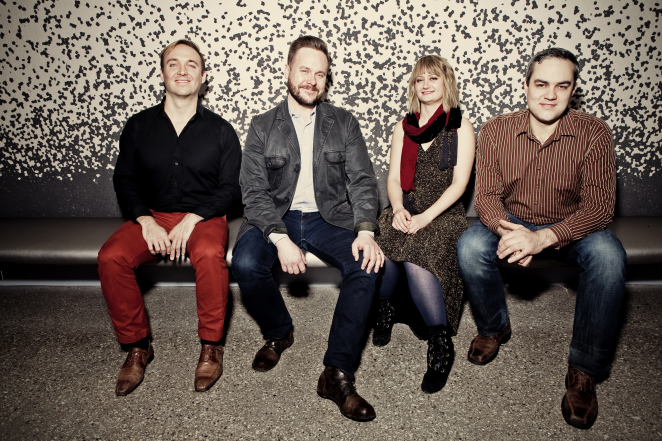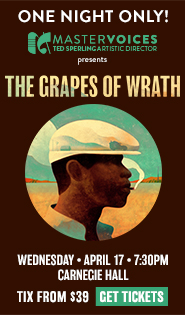Spektral Quartet brings vitality to genre-crossing music
One of the effects of the consistently strong Ecstatic Music Festival—running since 2011—is to be reminded how odd it is to have to argue for the importance of popular music.
The festival is organized and programmed by composer Judd Greenstein, one of the principals of the New Amsterdam record label. The label is at the center of the thriving contemporary movement that places pop music on the same level as new music in the classical tradition. This has been so before classical music knew it was “classical,” and composers and musicians have not only been incorporating pop music (better described as vernacular) into classical music since medieval times, but have themselves made vernacular music, from Josquin to Bernstein.
Today, the accumulation of academic credentials and the elevation of classical music as something culturally superior means that there is a lot of institutional and critical weight–and money–on the side of an artificial barrier. Nothing has done more to demolish that barrier—essentially by ignoring it—than New Amsterdam and the Ecstatic Music Festival.
Wednesday night, the festival brought together the Spektral Quartet (violinists Clara Lyon and Austin Wulliman, violist Doyle Armbrust and cellist Russell Rolen) from Chicago with singer and composer Julia Holter, for a solid concert that made classical music out of the vernacular, and made vernacular music with classical values.
Yet the main contrast on the program wasn’t between classical and vernacular but between vitality and stasis. Igor Stravinsky’s Concertino expressed the most life, especially in the full sound that Spektral produced out of the composer’s acerbic writing. The piece is a compact neo-Classical masterpiece, and the way Stravinsky pushes his tight musical cells around the beats and bar lines makes the music explode from the page.
Nothing was nearly as vital, but the rest of the music was still strong. Liza White recomposed Mos Def’s swinging vocal line, from The Roots’ song “Double Trouble,” into a chattering, argumentative series of dissonant double-stops, aggressive rhythms, and phrases that came close to articulating speech.
Another piece derived directly from vernacular music was Chris Fisher-Lochhead’s arrangement of James Blake’s vocal line from his song “I Never Learnt to Share.” Shorn of the original electronics and Blake’s soul stylings, Spektral sounded like they were playing a contemporary take on an isometric motet, which encapsulated the entire mutual history of classical and vernacular music in a few short minutes.
The quartet’s musicianship shined in “”Oh My God I’ll Never Get Home” from composer Dave Reminick’s large-scale The Ancestral Mousetrap. The musicians played slashing, rhythmic lines while taking turns reading lines from a poem, sometimes with intoned speech, at others bursting into brief bits of song. It sounded a lot like Harry Partch.
While those pieces were full of life, Holter’s music—Memory Drew Her Portrait for singer and strings, and the song “Marienbad”—and Alex Temple’s Behind the Wallpaper—written for Holter and Temple—waxed and waned.
The contrast between vitality and stasis centered on Holter’s voice, which has such purity and perfect intonation that the sound alone is powerfully expressive. But the words by her and Temple exemplified the affectless disaffection pervasive in indie-style vernacular music this century. The vocal rhythms were dull, especially after the shifting pulses and grooves of the previous music.
How one reacts to music like this is wrapped up in the minefield of taste—commodified subcultures and how vernacular music guides personal identity. The instrumental music was finely made, with structural and expressive ideas that went far beyond the norm for the vernacular. Holter’s piece is about someone going insane as she waits fruitlessly for her lover, and, as her mind implodes, the desiccated string writing builds to forceful coherence. There would be a powerful dramatic contrast there if the lyrics could express an identifiable humanity.
Behind the Wallpaper has a similar weakness and strength. The words seem to assume that a diffident stance is attractive and compelling to the listener—which, as a matter of taste, it may be. But the music is fascinating and deep; shifting meters belie the four-square lyrical sentiments, there is some excellent theatrical writing, the hint of Wagner’s Woodbird appears, and there is an intriguing audio track that begins in something like Crumb’s “Night of the Electric Insects” and ends with the crash and ebb of ocean waves.
Played with a sense of weight and importance by the Spektral Quartet, these transformations through time were more than enough to satisfy.
The Ecstatic Music Festival continues tonight with the Bang on a Can People’s Commissioning Fund Concert ecstaticmusicfestival.com



